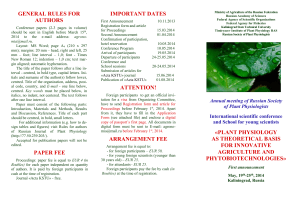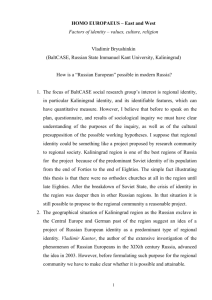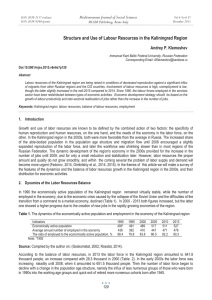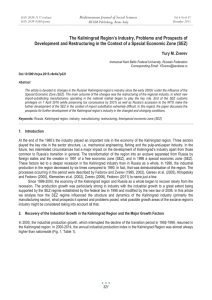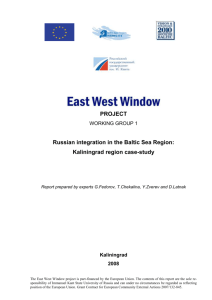sigita burbienė - Lietuvos Respublikos Seimas
advertisement
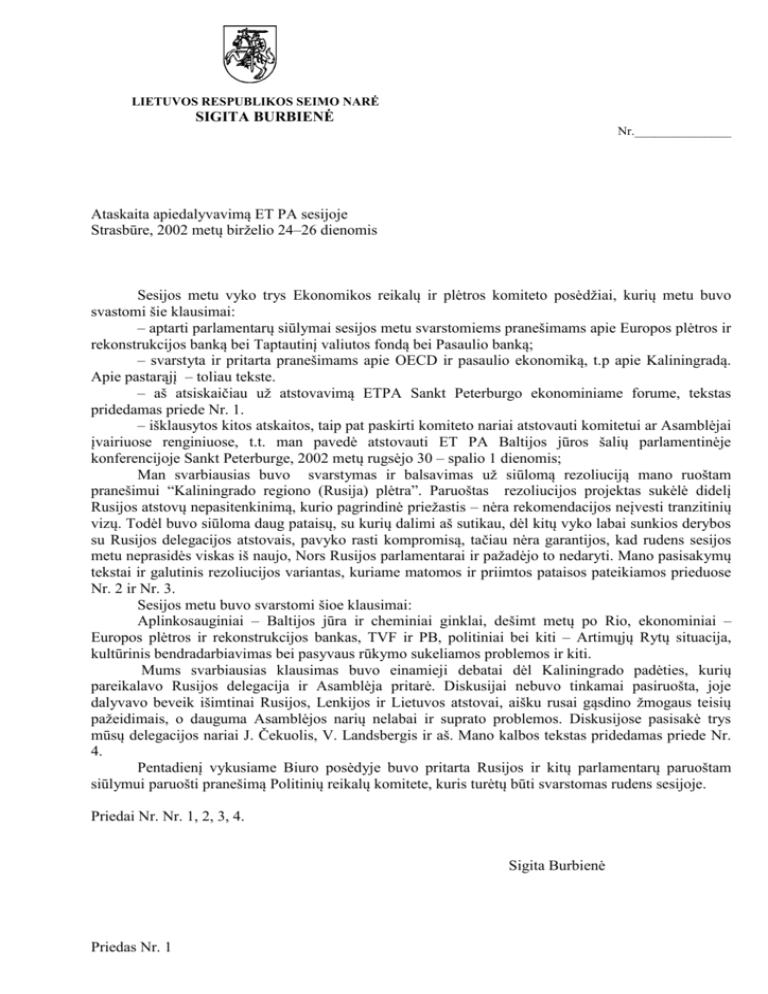
LIETUVOS RESPUBLIKOS SEIMO NARĖ SIGITA BURBIENĖ Nr._______________ Ataskaita apiedalyvavimą ET PA sesijoje Strasbūre, 2002 metų birželio 24–26 dienomis Sesijos metu vyko trys Ekonomikos reikalų ir plėtros komiteto posėdžiai, kurių metu buvo svastomi šie klausimai: – aptarti parlamentarų siūlymai sesijos metu svarstomiems pranešimams apie Europos plėtros ir rekonstrukcijos banką bei Taptautinį valiutos fondą bei Pasaulio banką; – svarstyta ir pritarta pranešimams apie OECD ir pasaulio ekonomiką, t.p apie Kaliningradą. Apie pastarąjį – toliau tekste. – aš atsiskaičiau už atstovavimą ETPA Sankt Peterburgo ekonominiame forume, tekstas pridedamas priede Nr. 1. – išklausytos kitos atskaitos, taip pat paskirti komiteto nariai atstovauti komitetui ar Asamblėjai įvairiuose renginiuose, t.t. man pavedė atstovauti ET PA Baltijos jūros šalių parlamentinėje konferencijoje Sankt Peterburge, 2002 metų rugsėjo 30 – spalio 1 dienomis; Man svarbiausias buvo svarstymas ir balsavimas už siūlomą rezoliuciją mano ruoštam pranešimui “Kaliningrado regiono (Rusija) plėtra”. Paruoštas rezoliucijos projektas sukėlė didelį Rusijos atstovų nepasitenkinimą, kurio pagrindinė priežastis – nėra rekomendacijos neįvesti tranzitinių vizų. Todėl buvo siūloma daug pataisų, su kurių dalimi aš sutikau, dėl kitų vyko labai sunkios derybos su Rusijos delegacijos atstovais, pavyko rasti kompromisą, tačiau nėra garantijos, kad rudens sesijos metu neprasidės viskas iš naujo, Nors Rusijos parlamentarai ir pažadėjo to nedaryti. Mano pasisakymų tekstai ir galutinis rezoliucijos variantas, kuriame matomos ir priimtos pataisos pateikiamos prieduose Nr. 2 ir Nr. 3. Sesijos metu buvo svarstomi šioe klausimai: Aplinkosauginiai – Baltijos jūra ir cheminiai ginklai, dešimt metų po Rio, ekonominiai – Europos plėtros ir rekonstrukcijos bankas, TVF ir PB, politiniai bei kiti – Artimųjų Rytų situacija, kultūrinis bendradarbiavimas bei pasyvaus rūkymo sukeliamos problemos ir kiti. Mums svarbiausias klausimas buvo einamieji debatai dėl Kaliningrado padėties, kurių pareikalavo Rusijos delegacija ir Asamblėja pritarė. Diskusijai nebuvo tinkamai pasiruošta, joje dalyvavo beveik išimtinai Rusijos, Lenkijos ir Lietuvos atstovai, aišku rusai gąsdino žmogaus teisių pažeidimais, o dauguma Asamblėjos narių nelabai ir suprato problemos. Diskusijose pasisakė trys mūsų delegacijos nariai J. Čekuolis, V. Landsbergis ir aš. Mano kalbos tekstas pridedamas priede Nr. 4. Pentadienį vykusiame Biuro posėdyje buvo pritarta Rusijos ir kitų parlamentarų paruoštam siūlymui paruošti pranešimą Politinių reikalų komitete, kuris turėtų būti svarstomas rudens sesijoje. Priedai Nr. Nr. 1, 2, 3, 4. Sigita Burbienė Priedas Nr. 1 PRESENTATION BY MS BURBIENE BEFORE THE COMMITTEE ON ECONOMIC AFFAIRS AND DEVELOPMENT ON 27 June 2002 (8.30 – 10 am) ON HER PARTICIPATION IN THE ST. PETERSBURG ECONOMIC FORUM, 19-21 June 2002 Dear colleagues, At the invitation of Mr Sergei Mironov, Chairman of the Federation Council of the Russian Federal Assembly, I had the honour to represent the Parliamentary Assembly, as a member of this Committee, in the 6 th St. Petersburg Economic Forum. As in previous years the Forum was held under the auspices of the Federation Council of the Russian Federal Assembly, the Interparliamentary Assembly of the CIS countries and with the support from the President and the Government of the Russian Federation, as well as a special organising foundation and city authorities. No less than 2000 participants from business circles, academia, state authorities and public institutions of CIS countries and abroad took part in the work of the Forum. Among the delegates also were representatives of international organisations such as the United Nations, the Nordic Council, the EU, the EBRD and the WTO (World Trade Organisation). Apart from the plenary sessions, 18 round tables were held on the subjects as diverse as future accession of Russia to the WTO, natural resources management, interregional and cross-border co-operation, investment and innovation policies, territorial and infrastructure development, corporate management, standardisation problems, new information technologies in finance and banking, reform of social policies, to mention just a few. We took part in one about WTO and Rusia negotiations to join the organisation. The whole event was understandably focused on the economic situation in the CIS countries, but predominantly the Russian Federation. Speaking at the opening of the Forum, Russian Prime Minister Mikhail Kasyanov and Mr Mironov spoke of the sustained growth and improving health of Russian economy, the country’s preparations to join the World Trade Organisation and the development of common economic area between Russia and the CIS countries through the socalled Eurasian Economic Consortium. They admitted though that much of the improvement in the country’s economic indicators still resulted from exports of raw materials, especially oil and gas. The Prime Minister said his government would keep a close watch on land reform, the dismantling of administrative barriers to investment, reorganisation of monopolies and further improvement of tax regimes so that country’s economic growth be upheld. As a matter of fact, Russia has officially applied to become the venue of the world exhibition EXPO-2010. Mr Jean Lemierre, President of EBRD, told the participants that nearly half of the 1 billion euro earmarked by the Bank for Russia in 2002 would go for projects in St. Petersburg. Better use of country’s energy resources and stimulating more investment – both domestic and foreign – remained the key challenges for Russia over the next decade. Mr Lemierre also signed a co-operation agreement with the Speaker of the Federation Council on the strategic partnership to promote St. Petersburg Economic Forum in western Europe. Mr Mike Moore, Director General of the WTO, said more progress in negotiations between Russia and the WTO was achieved in the last 12 months than over past 12 years. However, the most difficult issues of talks were still ahead. They include trade in agricultural goods and services, as well as adjustments in custom tariffs and procedures. A representative of the Russian Ministry of Economy confirmed that accession to the WTO was one of the present Government’s priorities. The ultimate goal of negotiations was to help Russian goods access to and compete better on the world market, as well as to open up specific Russian markets to foreign participation. Generally speaking the event was worthwhile attending to gain a better insight into the problems Russia and the CIS countries are struggling with. News people have even coined their own name for the event: St. Petersburg Davos; and such label is sure to mean something. Sigita Burbiene Priedas Nr. 2 2002.06.26 Dear collegues, last meeting in Strasbourg we were discussing explanatory memorandum of the report on Kaliningrad. If we have more time, we can speak a lot about the situation and what was changed, what are the requirements of Shengen, negotiatians EU –Lithuania, EU –Poland, EU –Russia, about closed chapters and so on. These are very complicated items for Kaliningrad region and their neigbours, KR and Russia try to avoid visas and especially transit visas, even blaming me presenting “political draft resoliution instead of economical”. I must say that no conversation with KF authorities was without visa issue, because many are worried, that economy and psichological climate can suffer because of that. Now we can pass to ammendments. After last meeting I’ve got ammendments to the text: Mr. Rogozin proposed 32 amendments, I fully agreed to 15, to 8 partly, other 7 –no. Mr Tulaev proposed 9, I agreed fully or partly to 6, not in all the cases in the same place, where it was proposed. Now amendments to draft resoliution. Thanks Priedas Nr. 3 The Need for European Solidarity to Ensure a Prosperous Future for the Kaliningrad Region Rapporteur: Ms Sigita Burbienė, Lithuania, SOC I. Preliminary Draft Resolution 1. As the European Union undergoes enlargement, the economic, social, public health and environmental problems of the Russian Region of Kaliningrad - situated between Lithuania and Poland and separated from the rest of the Russian Federation – are becoming acute. It is now for the member states of the Council of Europe – including those belonging to the European Union – to do their utmost to ensure that the situation of the Kaliningrad Region be rapidly improved in close co-operation between all parties concerned. Kaliningrad’s unique geographical position constitutes a singular opportunity for Europe to build economic prosperity and political stability in the Baltic Sea Region and beyond. 2. The Assembly welcomes the efforts of the Russian Federation to reduce the importance of the military sector in the Kaliningrad Region economy and to transform the latter through innovative steps such as the establishment of a Special Economic Zone (SEZ). It believes that legal provisions governing the functioning of the SEZ could be further improved in order to stimulate entrepreneurial activity in the Region, to attract more foreign direct investment, to increase the competitiveness of locally produced goods and services and to permit the region to share fully the benefits of the Russian Federation’s future membership of the World Trade Organisation. Every effort must be made to preserve the viability of the SEZ, such as by making adequate provisions in the new federal law on Free Economic Zones in the Russian Federation, by defining more clearly the division of competences between the federal and regional authorities, and by considering to establish a federal agency for the development of the SEZ. 3. The Assembly strongly supports multilateral efforts to promote regional co-operation involving the Kaliningrad Region, such as those undertaken in consultations between the European Union, the Nordic Council, the Council of Baltic Sea States, the Baltic Assembly on the one hand and the Russian Federation on the other, as well as in direct contacts between the Kaliningrad Region and the neighbouring countries of Lithuania and Poland. It encourages the Council of Europe, the European Union and the Nordic Council to establish, at the earliest opportunity and with the approval and assistance of the Russian Federal authorities, their official representations information offices in Kaliningrad. Furthermore it encourages the opening or expansion, as the case may be, of the consulates of Lithuania and Poland in the Kaliningrad Region of Russia and the opening or expansion of Russian consulates in Lithuania and Poland, the Russian Federation, on the basis of a common agreement and as soon as possible without delay. 4. With the approaching accession of Lithuania and Poland to the European Union, it its becoming urgent for all parties involved to reach a mutually acceptable solution as regards the movement of persons and goods to and from the Kaliningrad Region through the territories of Lithuania and Poland. Taking into account the existing economic and cultural ties as well as the human contacts between Lithuania, Poland and the Kaliningrad Region of the Russian Federation, all parties should be ready to participate in such discussions on the understanding that the agreements reached must should be compatible with the high standards of the Council of Europe and international agreements acquis communautaire and the Schengen agreement. 5. The Assembly believes that a flexible method of implementation will be needed in the likely event that a transit visa regime is retained vis-à-vis Russian citizens travelling by road or rail between the Kaliningrad Region and the remainder of Russia across the territory of the future member states of the European Union. It calls on the European Union and its member states to assist the authorities of the countries concerned Lithuania, Poland and the Russian Federation in preparing for the issuance, in due course, of multi-entry long-term visas at reasonable cost, with the possibility of their being made gratuitous for students and young people. It also invites the Russian federal authorities to facilitate the issuance of passports valid for foreign travel to its citizens, in particular those residing in the Kaliningrad Region and asks the EU to provide financial assistance toward this process. This would also serve to promote cross-border economic co-operation. 6. The Assembly calls for an upgrading of the physical infrastructure and procedures at Kaliningrad border crossings and asks the European Union to enhance its assistance to the federal and Kaliningrad authorities in this field. 7. The Assembly welcomes the ambitious Targeted Federal Programme for the Development of the Kaliningrad Region up to 2010 elaborated by the Russian Government and hopes that the Russian federal authorities, as well as the Kaliningrad administration and Duma, will ensure the allocation of adequate budgetary funds for the implementation of this Programme in line with commitments. In view of Kaliningrad’s pronounced dependency on imported energy and raw materials and its need to develop international trade, the Assembly considers the development of its energy and transport sectors to be of particular importance. 8. The shortage of investment in the Kaliningrad Region, aggravated by decades of under-investment, is a major brake to its development. The Assembly therefore asks the European Bank for Reconstruction and Development and the European Investment Bank to consider establishing, jointly with the federal and Kaliningrad authorities and the Region’s business sector, a multilateral insurance fund for the protection of investment within the framework of the SEZ and the Target Federal Programme. It also hopes for a speedy conclusion of the negotiations for treaties on the protection of investment in the Kaliningrad Region and on the avoidance of double taxation between the Russian Federation on the one hand and Lithuania and Poland on the other, with special reference to the Kaliningrad Region. 9. The standard of living in the Kaliningrad Region is still substantially below that of the neighbouring states. Poverty, disease, pollution, unemployment and crime seriously affect the standard of living in the Kaliningrad Region and prejudice its sustained development. Multilateral aid agencies concerned must therefore do their utmost to secure adequate financing for development projects in the Region in these and related fields. The European Union should co-ordinate the use of PHARE, TACIS and INTERREG programmes for the co-financing of projects in Kaliningrad together with Russian federal and regional authorities, draw up the list of priority projects and envisage the creation of a separate budget line for the Kaliningrad Region within the TACIS programme for the Russian Federation. 10. Following recent consultations between the European Union and the Russian Federation, in which the parties expressed concern over the problems future of the Kaliningrad Region and especially the visa and goods transit issues, the Parliamentary Assembly hopes that all problems will be solved without prejudice to the sovereignty of either the Russian Federation and the Kaliningrad Region on the one hand, or the of neighbouring countries. The Parliamentary Assembly calls on all parties concerned to take an active part in the quest for the best possible solutions for all. Priedas Nr. 4 2002.06.25 Kaliningrad region Dear collegues, Economic affairs and develpoment committee of PA is preparing a report on the item – “The need for european solidarity to ensure as prosperous future for Kaliningrad Region, and I’m a reporter of it. So PA is not standing aside. As it is said in draft report – KR of RF needs best possible conditions for active economic and social cooperation between KR and it’s immediate and close neigbours. As I had visited the region and had exchange of views with the authorities, as well as citisens, I must say they are very much concerned about the future development of KR. And all of them are interested to have the best relations with their neighbours – Lithuanian and Poland, the same wish is from Lithuania and Poland. I just mention that Lithuanian investment are 16 percent of all foreign, more than German and Polish. So you can understand businessmen of our country is very much interested to have as few obstacles as possible. There are several attempts for better development of the region first of all law on Special economic zone and Targeted federal programme for the development of KR. And both federal and regional authorities attempts are needed for implementation of these means, as infrastructure, motorways, energy supply, environment needs a lot of investment and real work. KR is concerned as a pilot region for RF– EU cooperation, the project was suggested by Prezident V. Putin on 22 october 1999 in Helsinki. KR authorities and especially businessmen are expecting much from implementation of this idea. This is up to Russia to find a way how to fulfil the task. Going to border crossing, I must mention, that only few of all 23 border crossing points are enough modern, while others are terrible, the capacity of crossing points overloaded 3–4 times and long lines of vehicles are standing on both sides of the border. Don’t you think that standing in cold, heat, rain, snow for 8–10 up to 24, is really violation of human rights? Two most overcrowded points– Bagrationovsk with Poland and Chernyshevsk with Lituania need not less 3 mln euros each to improve them, adding one more point – Sovetsk– Panemune, where the bridge can simply crash. So first of all these problems are to be solved, as standing for hours to cross the border is really damaging the economy, first of all that of KR of RF. Some assistanse as loans and grants has come, but not enough. By the way, businessmen are more concerned of this issue and at least some technical standards close to those of EU, than on political speeches, and most of them believe, that after Poland and Lithuania joins EU and changes take place, “black” and “grey” economy will diminish, first of all these going seversal times a day carrying various goods, from both sides of the border, by the way. As an economist and politician I must say, that in order to solve problems, you must solve them, not shout that all the others around are guilty. Lithuania is able to understand russian people, we remember very good the terrible lines near German ambessy, and don’t want the same in Kaliningrad and never propose closed vagons, as this is really humilating. But visa issue first of all is legal problem, than technical, but if somebody want to change it to political it won’t help. Technical problem of enlargment of consulate of Lithuania or issuing passports for russian citisens, as now 10 documents are valid for identification, stands on the one point for months. The last sentence –journey from Russia to Russia must be free, but if it includes travelling on non Russia, but other sovereign state land, that makes things different. Thank You

